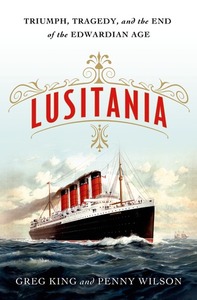Take a photo of a barcode or cover
15 reviews for:
Lusitania: Triumph, Tragedy, and the End of the Edwardian Age
Penny Wilson, Greg King
15 reviews for:
Lusitania: Triumph, Tragedy, and the End of the Edwardian Age
Penny Wilson, Greg King
I really enjoyed this book, I mean as much as a historian should obviously enjoy such a tragic event. What I liked was how detailed it all was, especially in how the ship was built outside and inside, for first and second class. As well as how much went into understanding everything about all these poor individuals. It was great not to listen to bias as well from a modern perspective and seeing how the Germans planned it while at War. I really enjoyed this book!
This was a disappointing read. It rattled off so many people and names who were of little consequence to the story of the sinking - it was difficult to follow. Would have been better to track or talk about 4 or 5 (not 30+) people and the captain.
Although it may not have been as narratively illustrative as Larson's Dead Wake, King's Lusitania was still an engrossing read and an easy start for readers new to the subject of the Lusitania's last crossing.
I don't have much to say about the uniqueness of this history compared to others of the same subject. I will say that King's was extremely quote-heavy. Almost too much so. But I don't think it took away from the telling, other than perhaps making the reading experience a little clunky.
I do think this wreck in particular needs more public attention - preferably not of the cinematic variety. Although the water was colder for sufferers of the Titanic wreck, the evacuation of the Titanic would have felt like a well-oiled machine compared to the Lusitania. I'm talking absolute nightmare fodder: mass amounts of people being crushed by lifeboats; panicked passengers being trapped in elevator lifts as they slowly fill up with water; a woman going into premature labour as she freezes and drowns in the water. It's hard to think of a single event, an event lasting less than twenty minutes, as horrifying as this one.
More than anything else, it's important for writers of historic disasters to capture that horror and, in turn, the significance of it and the impact on the years following it. Although it wasn't my absolute favourite on the subject, I think King was definitely successful in pulling this off.
I don't have much to say about the uniqueness of this history compared to others of the same subject. I will say that King's was extremely quote-heavy. Almost too much so. But I don't think it took away from the telling, other than perhaps making the reading experience a little clunky.
I do think this wreck in particular needs more public attention - preferably not of the cinematic variety. Although the water was colder for sufferers of the Titanic wreck, the evacuation of the Titanic would have felt like a well-oiled machine compared to the Lusitania. I'm talking absolute nightmare fodder: mass amounts of people being crushed by lifeboats; panicked passengers being trapped in elevator lifts as they slowly fill up with water; a woman going into premature labour as she freezes and drowns in the water. It's hard to think of a single event, an event lasting less than twenty minutes, as horrifying as this one.
More than anything else, it's important for writers of historic disasters to capture that horror and, in turn, the significance of it and the impact on the years following it. Although it wasn't my absolute favourite on the subject, I think King was definitely successful in pulling this off.
I enjoyed the personal nature of the writing style, getting to know both passengers and crew on the ship with well-explained details of the Great War circumstances surrounding the sinking. Little is known about the third class passengers, but while it is understood that none in particular could be profiled as the first and second class passengers are, it was deeply disappointing that there is barely a mention of them and their accommodations on the ship other than how many beds they had in their staterooms. I had a cousin aboard the ship (Annie Lyons) and was anxious to learn something about what her experience would have been. Where did they dine? Did they share state rooms with strangers? Etc.
Well documented, except for the inquest itself. The author can bring to mind the horrific images of this sad and terrible tragedy, I just hope I can sleep tonight!
informative
sad
tense
medium-paced
This was one of those books that I just liked, you know? I didn't love it, I didn't hate it -- it fell squarely in the middle. It wasn't a bad book by any means, there were parts I quite enjoyed, but it was all a bit, I don't know...slow, I suppose. This book does have good information in it and I am glad I read it, but it's not as good as some of the other books about the Lusitania that are out right now. I would still recommend this if you are interested in the ship and the era. 3.5 out of 5 stars.
Germany and England are already embroiled in World War I and German U Boats are patrolling the sea. But on the luxury liner Lusitania a first class passenger can still enjoy the excess of the Edwardian Era.
The early chapters of Lusitania are fascinating. The reader becomes immersed in the era and the lifestyles of the rich and famous traveling on the boat. I was thoroughly intrigued by the information and history of the liner and the warnings from the Germans regarding travel through the war zone.
Unfortunately, the authors are heavy on research and information and nothing gets cut. Instead of focusing on a few interesting characters the book is packed with information about as many passengers as possible until it becomes drivel. Just too much.
Once Lusitania is hit by the torpedo, the book becomes exciting again. However, even the action becomes tedious. The same scene is described over and over by numerous witnesses.
Overall, what could be an interesting book is burdened by the excess of information.
The early chapters of Lusitania are fascinating. The reader becomes immersed in the era and the lifestyles of the rich and famous traveling on the boat. I was thoroughly intrigued by the information and history of the liner and the warnings from the Germans regarding travel through the war zone.
Unfortunately, the authors are heavy on research and information and nothing gets cut. Instead of focusing on a few interesting characters the book is packed with information about as many passengers as possible until it becomes drivel. Just too much.
Once Lusitania is hit by the torpedo, the book becomes exciting again. However, even the action becomes tedious. The same scene is described over and over by numerous witnesses.
Overall, what could be an interesting book is burdened by the excess of information.
This book read like a list of information, and biographies of rich people who had been aboard the ship. There was no storyline, just scattered information and WAY too many people mentioned to ever have a chance of keeping track.
If you're looking to learn about the Lusitania, this is NOT the book I'd recommend.
If you're looking to learn about the Lusitania, this is NOT the book I'd recommend.
emotional
informative
mysterious
sad
medium-paced


